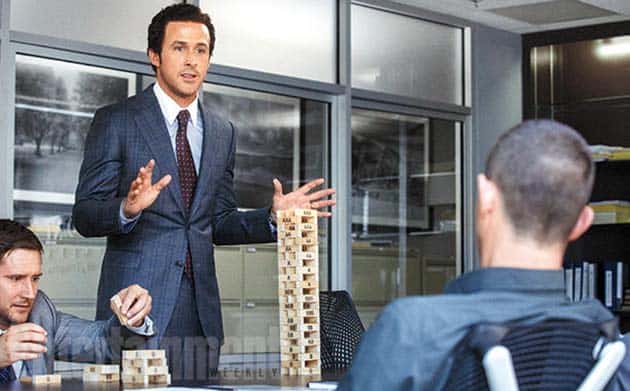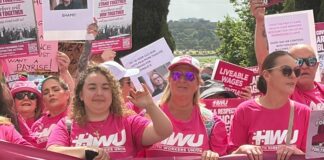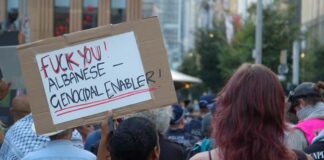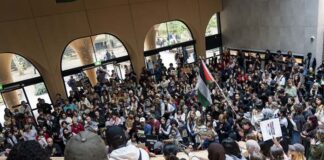The Big Short blows the whistle on the catastrophe and madness of a system run by bankers and profiteers. It leads you through the glassy corridors of Wall Street in the months leading to the Global Financial Crisis and shows how the drive for profits had infected everything: CEOs, ratings agencies and the government.
Most of us are familiar with the austerity politics that hit the working class around the world after the 2007 crash—the waves of ravaging unemployment and welfare cuts that keep coming at us. This film fills in some blanks about whom and what we have been paying for.
The (mostly true) story follows four oddball fund managers who cotton on to just how dodgy the mortgage investment boom was.
Ryan Gosling’s character, Jared Venet, neatly demonstrates the impending disaster with a Jenga tower, each block representing a bundle of debts that agencies had outrageously over-rated. We later find out Standard & Poor’s and other agencies were issuing high ratings based on fees rather than actual quality. So with a slight increase in mortgage defaults, the tower—the US housing market—crashes.
In another explainer, a chef chops up three-day-old fish, representing rancid investments, and throws them into a fish stew, representing Collateralized Debt Obligations or CDOs, which agencies issue AAA ratings to! Why was no one trying to prevent this impending disaster? “The banks are too busy getting paid obscene fees to sell these bonds”, explains Venet.
Before committing to “shorting” (betting against) the housing market, Mark Baum’s investor team takes a field trip to reality. They discover the creeping malaise of unemployment, debt, defaults and impending homelessness in a mortgage belt area.
But no one can acknowledge reality—when the crash begins it’s “just a gully”, repeats everyone along the profit chain, from chirpy real estate agents through to mortgage brokers, sleazy bankers and CEOs.
Bailing them out
The four characters who bet against this grand fraud (and the audience) get momentary satisfaction in seeing the lies come crashing down when the bubble finally bursts. But the satisfaction gives way to a deeper horror, as we remember who ended up footing the bill for the bankers’ lunacy.
Australian taxpayers coughed up $120 billion dollars to underwrite the banks during the crisis—but it’s schools, hospitals and single parents that get the blame for deficits.
The US government committed $16.8 trillion to paying out banks and companies. The Greek people have suffered devastating austerity to pay for €230 billion worth of “loans” to avoid a government default on its debts, 90 per cent of which actually went straight through Greece into European banks.
Brad Pitt’s character, Ben Rickett, spells out the ramifications of a crash: “If we’re right, people lose homes. People lose jobs. People lose retirement savings, people lose pensions. You know what I hate about f*cking banking? It reduces people to numbers—every 1 per cent unemployment goes up, 40,000 people die, did you know that?”
“They knew taxpayers would bail them out”, sighs Mark Baum as he watches the fallout. And the dawning realisation that it was the political system that protected and bailed out these profit-seeking bankers makes The Big Short stronger than other accounts, which have often limited their critique to the shocking immorality of the financial sector.
Big Short doesn’t explain the crisis of profitability that gave rise to the bubble, and its roots in the operations of capitalism itself. And a Bernie Sanders-style prescription of prosecuting the culprits and breaking up the big banks is offered as the justice that should have prevailed—not so much an overhaul of our social order.
None of the mass rebellions against the system that were prompted by the crisis, including Occupy, the Arab Spring and the ongoing upheaval in Greece are given any attention. Pointing to them might have alleviated the gloomy self-loathing that afflicts the protagonists at the end, as they realise they have done nothing to actually challenge the system.
But this film should fuel the confidence of those of us who are fighting the madness and irrationality of capitalism.
In a closing scene, two young investors walk through the empty Lehman Brothers trading room, looking at the chambers of wealth and power they had been excluded from for years. Like discovering the fraud behind the Wizard of Oz in the Emerald city, they realise that there are no “grown ups” running the system. It’s an emboldening message—unless we want to see the corruption and crisis continue we are going to have to take control.
By Lucy Honan
The Big Short
Directed by Adam McKay
In cinemas now






